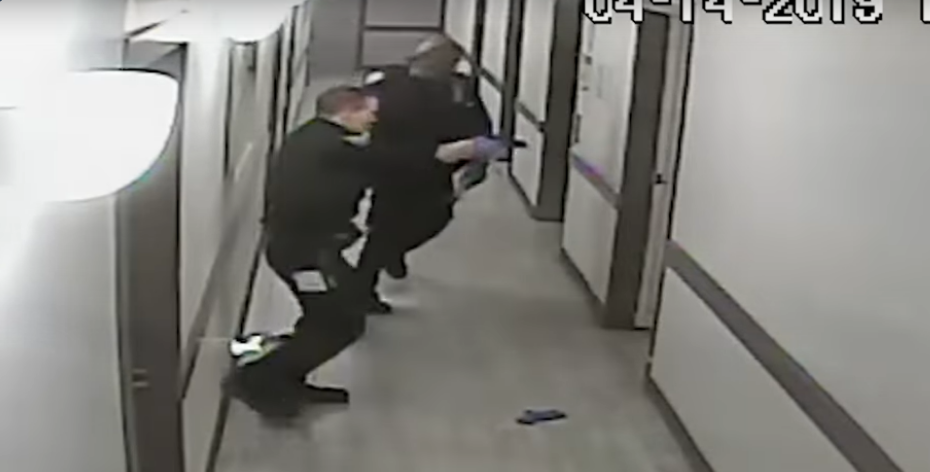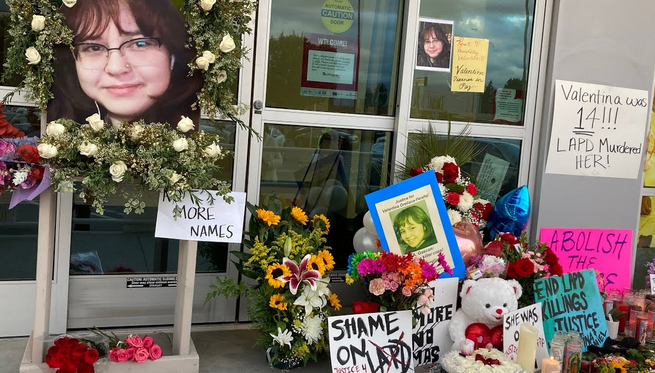Bill Clinton challenged by Black Lives Matter
[Speaking Truth To Power]
Last Friday, former President Bill Clinton said he regretted becoming involved in an acerbic exchange with Black Lives Matter protesters in Philadelphia on Thursday, because as he put it “I know those young people yesterday were just trying to get good television. But that doesn’t mean that I was most effective in answering it.”
Is that all he really thinks is behind the anger of so many Black people? These insensitively dismissive remarks by the former president far from inspiring confidence in the Clintons, should make Black America think hard about how loyal we want to be to them, especially as Hillary Clinton courts Black votes.
President Clinton’s condescending comments came one day after he was heckled at a rally in Philadelphia over his signing of the 1994 Crime Bill—which has led to the increase in the mass incarceration of African-Americans through tougher penalties for non-violent drug crimes. This disastrous Crime Bill has had devastating consequences on a Black America which was already under economic attack by political forces fighting to undercut the gains made by the Civil Rights Movement of the 1960’s.
Far from not being “effective in answering,” Bill Clinton, in fact, exposed his thoughtlessness towards the real plight of African-Americans with his bigoted comment that many people believe was his intentional dog whistling for some of the more “conservative” White male voters that his wife Hillary needs to win over.
Responding to signs held up by the young activists, some of which denounced Hillary for once using the term “super predators” to refer to young African Americans who committed crimes, he said “I don’t know how you would characterize gang leaders who got 13-year-old kids hopped up on crack and sent them out on the street to murder other African-American children,” Clinton said. “Maybe you thought they were good citizens. She didn’t.”
Pure condescending lunacy.
Were most of the Black people who were locked up during his presidency “hopped up on crack,” as he is suggesting? Were most of those imprisoned during this time murderers of Black people? Or were they not low-level consumers of drugs? Is he also really trying to tell us incarcerating those who consume crack made Black people safer?
“Tell the truth,” Clinton insisted.
Well the awful truth here is: President Clinton continues to use Black people as political pawns; much in the same way as Republicans do. “Progressive” Democrats like the Clintons are more subtle when they use racism to obtain political objectives.
Let’s remember that it was then Governor Clinton, during the 1992 Presidential Elections, who scurried back to Arkansas to oversee the execution of Ricky Ray Rector, a mentally-impaired convict. Months later, still calculating, Clinton made the decision to attack Hip-Hop activist Sister Souljah, during a Jesse Jackson’s Rainbow Coalition event. These two incidents were no doubt political photo-op chess moves made to send a signal to White voters that if they voted for Clinton that they didn’t have to worry about him keeping Negroes in check.
During his Philadelphia appearance, Mr. Clinton also insinuated his flooding of Black communities with more police made the people safer. This is an argument many White politicians, including Rudolph Giuliani, make repeatedly. Why didn’t he try to flood Black neighborhoods with economic capital to resurrect the crumbling communities?
Ironically, this red herring argument—for increasing White police officers in Black communities—is the same one those who crafted racist enforcement policies like “Broken Windows” always use. Why do these dishonest folk act like economic segregation isn’t the driving force behind most of the crime in Black America? Instead terms like “Black-on-Black” crime are used to suggest that the violence is pathological; mere behavioral problems.
Economic investment is the obvious answer to many ills in Black communities—but institutional racism has always done everything in its power to stifle the economic advancement of Black people ever since Slavery ended.
President Clinton, as a shrewd professional politician, surely knows that the lack of economic opportunities lie at the heart of these “crime” problems. But most of these politicians—including far too many so-called “progressive” liberals—pretend not to know this. Clinton’s comments also echo the racist belief, by many Whites, that there is inherently something very violent and criminal within the DNA of large segments of Black America.
No doubt, when he says he wasn’t “effective in answering,” the questions of protesters, what’s really worrying to him is that he exposed racist thinking when he tried to say those against his crime bill somehow support Blacks who kill other Blacks. Moreover, since this bill surely incarcerated more non-violent offenders than anyone else, his statement is truly absurd.
It was a non-apology apology; the earlier comments he made were already out there — now he was engaged in public relations to avoid backlash from the Black votes that Hillary also needs.
In an attempt to deflect, and legitimize this crime bill, President Clinton mentioned the fact that Black congressional leaders signed on to the legislation. That is certainly true. Because of this troubling reality, Clinton seems to be saying why are you only blaming me?
There is no contradiction. Many establishment Black “leaders” sometimes advance their own career interests above those of Black people. Many spend more energy appeasing their beleaguered constituents. Such “leaders” must be held accountable and voted out.
Imagine, we have yet to have a Congressional panel on police abuse and murder; in spite of all the police outrages we’ve witnessed over the last few years. Chicago Congressman Bobby Rush tried to empanel a hearing on police brutality and only about nine members of Congress supported this initiative; not a single White “progressive” lawmaker backed him.
This is beyond disgraceful.
Young Black Americans are rightly fed-up. They don’t want to hear the same lame excuses to justify racist repression from the police and the criminal “justice” system combined with neglect from government, at every level, to offer equitable access to resources.
There is no magic behind it. When Mayor Marion Barry in Washington, D.C., and Maynard Jackson in Atlanta, respectively, guaranteed at least 25% of City contracts African American -owned businesses, thriving Black middle class was created in each city within a few years.
In New York by comparison, of nearly $15 billion in city spending with vendors, Black and Latino -owned businesses get 0.9% of the business.
The best that President Clinton could come up with on Friday was “I almost want to apologize” for his remarks. Another stab in the back moment.
Many Black politicians and preachers are currently rushing to endorse Hillary Clinton and influencing those who follow them to do the same. Civil Rights icons like Rep. John Lewis and Rep. James Clyburn have even made bizarre criticisms of Senator Bernie Sanders—who also supported this crime bill—while extolling the supposed virtues of Hillary Clinton.
There will obviously be political and economic rewards for these loyalist politicians and preachers. Political patronage will bear fruit for them from the Clinton political machine.
But what will their loyalty mean for the African American masses?
On April 19, Democrats in New York will be voting for either Clinton or Sanders.
What have really done to force either candidate to commit to concrete plans about what they intend to do to advance the interests of Black America?
President Clinton’s flippant remarks on Thursday and Friday should give all Black people good reason for legitimate pause.
Black America must learn that we can’t afford to trust that politicians will do the right thing after they secure the vote.
We must continue to put pressure on them. Black Lives Matter aren’t loyalists. They are agents of change.
Young rebels with a cause — for a new generation.












